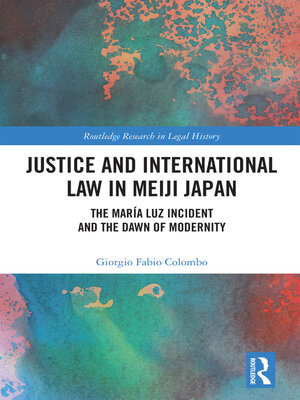Justice and International Law in Meiji Japan
ebook ∣ The María Luz Incident and the Dawn of Modernity · Routledge Research in Legal History
By Giorgio Fabio Colombo

Sign up to save your library
With an OverDrive account, you can save your favorite libraries for at-a-glance information about availability. Find out more about OverDrive accounts.
Find this title in Libby, the library reading app by OverDrive.



Search for a digital library with this title
Title found at these libraries:
| Library Name | Distance |
|---|---|
| Loading... |
This book carries out a comprehensive analysis of the María Luz incident, a truly significant episode in Japanese and world history, from a legal perspective. In July 1872, the María Luz, a barque flying the Peruvian flag, carried Chinese indentured servants from Macau to Peru. After the ship stopped for repairs in Kanagawa Bay, a number of legal issues arose that were destined to change the perception and use of the law in Japan forever. The case had a tremendous impact on the collective imagination, both Japanese and international: it is one of the first occurrences in which an Asian country decided to resist the pressure of a Western nation, and responded using the most refined tools of domestic and international law. Moreover, the final outcome of the case (arbitration in front of the Czar of Russia) marks the debut of Japan on the stage of international arbitration. While historians have written widely on the subject, the legal importance of this event has been relatively neglected. This book uses the case to explore the technical legal issues Japan was facing in its transition from pre-modernity to modernity. These include unequal treaties, extraterritoriality clauses, the need to establish an updated judicial system, and a delicate balance between asserting sovereignty and resorting to diplomacy in solving disputes involving foreigners. Based on original documents, this book is an invaluable resource for researchers and academics in the fields of legal history, dispute resolution, international law, Japanese history and Asian studies.







